Harvesting Psyllium from Plantain
This is my second post on using Plantain, make sure you check out post one on Plantain, Picking Plantain, An awesome medicinal yard weed.
Parts Used & Where Grown: These green weeds grow pretty much anywhere in the world where there is sufficient water. Plantain should not be confused with the banana-like vegetable of the same name. The leaves of plantain are primarily used as medicine. The seeds of plantain can also be used medicinally, having mild laxative effects similar to the seeds of psyllium, a close relative of plantain.To pin this blog post on Pinterest
Common Names: Broadleaf Plantain, Broad-leaved Plantain, Cart Track Plant, Common Plantain, Dooryard Plantain, Greater Plantago, Healing Blade, Hen Plant, Lambs Foot, Roadweed, Roundleaf Plantain, Snakeroot, Soldiers Herb, Waybread, Wayside Plantain, White Man’s Foot Prints. (info here)
psyllium /psyl·li·um/ (sil´e-um) 1. a plant of the genus Plantago. 2. the husk (psyllium husk) or seed (plantago or psyllium seed) of various species of Plantago ; used as a bulk-forming laxative.
Are we crazy? Maybe, but it for sure is a good crazy!
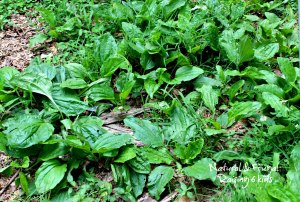 How good does it feel to know you can walk out in your yard & pick something that grows in abundance for free & use it to make great DIY products for health and beauty? To me it feels priceless & amazing. And lets not forget it is a special kind of crazy, why? Because I am crazy for DIY :) DIY for sure fits in my Frugal lifestyle but think about just how much more Frugal it is to totally do DIY from scratch from a common yard weed. Now you want to be that kind of crazy I can tell. But in reality we are not crazy at all, we are foraging & getting back to nature & really that is just amazing.
How good does it feel to know you can walk out in your yard & pick something that grows in abundance for free & use it to make great DIY products for health and beauty? To me it feels priceless & amazing. And lets not forget it is a special kind of crazy, why? Because I am crazy for DIY :) DIY for sure fits in my Frugal lifestyle but think about just how much more Frugal it is to totally do DIY from scratch from a common yard weed. Now you want to be that kind of crazy I can tell. But in reality we are not crazy at all, we are foraging & getting back to nature & really that is just amazing.So calling all amazing crazies to again join me in picking plantain!
There are several types of plants that produce Psyllium & you can research the other kinds & I even reference a few below to show Psyllium benefits, but I will be collecting the Psyllium off the broad leaf Plantain (weed), in my research it appears that possibly the Psyllium seeds from Plantain might not be as effective but I can find no proof of this.
Psyllium how to:
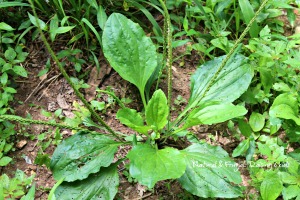 When I did the other blog post on Plantain the stalks, spikes or blooms on them had not started popping up yet, these stalks are what we will be picking & where we will be harvesting our Psyllium, are you ready?
When I did the other blog post on Plantain the stalks, spikes or blooms on them had not started popping up yet, these stalks are what we will be picking & where we will be harvesting our Psyllium, are you ready?July to September seems to be the perfect time to pick Psyllium in upper TN.
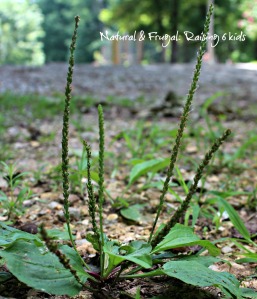 As pictured these stalks grow in the center of the Plantain like tall spikes, usually 3 to 5 or so of them, simply cut them off at the base & lay in your basket or bucket, whatever you are carrying to pick plantain. You can use scissors to cut them off, I just picked with my bare hands, but whatever works for you. After you have picked the desired amount you can fill your sink with cool water & a few tbsp. of baking soda & sit the stalks in the water & gently move them around to clean them, leave them about 10 minutes & simply drain, no need to rinse. Pat the stalks dry & then in bunches tie them together with yarn or string from the cut end, make sure the bunches are not to big, only about enough stalks to hold in your hand while tying them. Then simply hang them in a closet, cupboard or room where they can safely dry, some also prefer to hang them in a sunny window & not dark, so I have tried both ways to the same results but my house is not damp. Some also prefer to dry them in a dehydrator for a bit but I have not tried this yet.
As pictured these stalks grow in the center of the Plantain like tall spikes, usually 3 to 5 or so of them, simply cut them off at the base & lay in your basket or bucket, whatever you are carrying to pick plantain. You can use scissors to cut them off, I just picked with my bare hands, but whatever works for you. After you have picked the desired amount you can fill your sink with cool water & a few tbsp. of baking soda & sit the stalks in the water & gently move them around to clean them, leave them about 10 minutes & simply drain, no need to rinse. Pat the stalks dry & then in bunches tie them together with yarn or string from the cut end, make sure the bunches are not to big, only about enough stalks to hold in your hand while tying them. Then simply hang them in a closet, cupboard or room where they can safely dry, some also prefer to hang them in a sunny window & not dark, so I have tried both ways to the same results but my house is not damp. Some also prefer to dry them in a dehydrator for a bit but I have not tried this yet.
You can also wait until late summer or fall & collect the stalks with dried seeds on them if you prefer to let them dry on the Plantain plant.
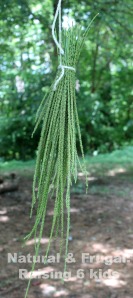 After they are dry simply run a butter knife backwards on the stalk to get the Psyllium seeds off or use your fingernails. Then either grind them or use by adding to smoothies, protein shakes, on food like oatmeal etc. (can be used ground or whole depending on your preference. Though most do claim better benefits from ground psyllium. A tea can also be made from the whole or ground seeds by simply steeping them in hot water.
After they are dry simply run a butter knife backwards on the stalk to get the Psyllium seeds off or use your fingernails. Then either grind them or use by adding to smoothies, protein shakes, on food like oatmeal etc. (can be used ground or whole depending on your preference. Though most do claim better benefits from ground psyllium. A tea can also be made from the whole or ground seeds by simply steeping them in hot water.Dried psyllium kept in a dark cupboard has around a 2 year shelf life.
Health Benefits & Uses of Psyllium:
Studies have found that Psyllium is beneficial in the treatment of a variety of health conditions. In fact, the FDA has even approved advertisers and food packagers from stating that Psyllium is an effective ingredient to lower cholesterol and reduce the risk of heart disease. Many people have also found Psyllium to be effective when treating: Bleeding hemorrhoids, Boils, Bronchitis, Colon cancer, Crohn's Disease, Dysentery, Gallstones, High blood pressure, Incontinence, Irritable Bowel Syndrome (IBS), Poison ivy rash, Psoriasis, Stings and insect bites & Ulcers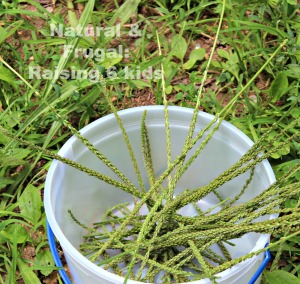 Psyllium seeds contain about 19% fiber, 18.8% protein, and 10-20% triglycerides. Psyllium seed husk is 34% insoluble fiber and 66% soluble fiber.
Psyllium seeds contain about 19% fiber, 18.8% protein, and 10-20% triglycerides. Psyllium seed husk is 34% insoluble fiber and 66% soluble fiber.Plantain psyllium seeds can be used in hot cereals, muffins, & breads to ease bowel back up & constipation.
Psyllium seed husk are indigestible and are a source of soluble dietary fiber. They are used to relieve constipation, irritable bowel syndrome, and diarrhea. They are also used as a regular dietary supplement to improve and maintain regular GI transit. The inert bulk of the husks helps provide a constant volume of solid material irrespective of other aspects of the diet or any disease condition of the gut. Some recent research is also showing them to be promising in lowering cholesterol and controlling diabetes.
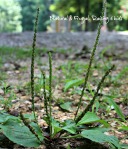
Ground psyllium seed can be used instead of flour gluten-free baking, for roasting. You can even take a spoonful or two for regularity.
The psyllium used in laxatives is made of the seeds of a plantain.
Plantain psyllium is great used as a dietary fiber in products such as Metamucil etc.
Health Benefits of Psyllium Seed Husk
Go check out part one of this blog post: A DIY Life: Picking Plantain, An awesome medicinal yard weed.
psyllium seed
No comments:
Post a Comment